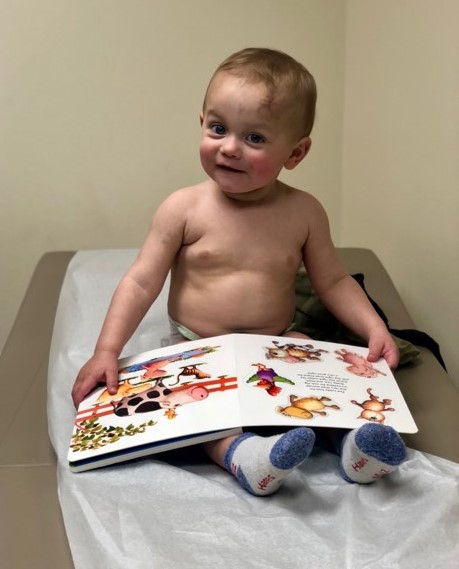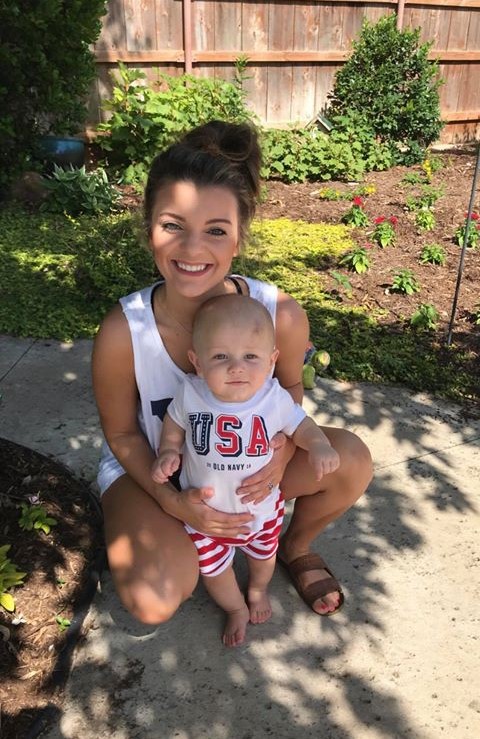Saving Lives in Rural Oklahoma
Posted on: 4/16/19
 |
 |
| Lincoln Meier at Okeene Municipal Hospital |
Amanda Meier with 16-month-old son, Lincoln
|
In January of this year,
Amanda Meier was home with her 16-month-old son,
Lincoln, who was out of daycare after being diagnosed with pneumonia the day before. Lincoln had a runny nose and a rattling, wet cough, but he was in good spirits. Amanda and Lincoln watched cartoons together, cuddled and napped in their home in Okeene, Oklahoma.
When Lincoln woke up for a morning snack, things took a turn for the worst. He began alternating between choking and projectile vomiting, which he had never done before.
Amanda, who works at the Okeene Municipal Hospital, thought she recognized the problem.
“He was constantly coughing and gasping for air, but he wasn’t choking on food, he was choking on mucus that was built up in his throat,” she said. “At this point it had all collected and it was just too much for him.”
Realizing something serious was happening, she sprang into action.
“I called my mother who luckily lives three doors down the road. She made her way to my house in less than 30 seconds and we grabbed Lincoln and drove as fast as we could to the nearest Emergency Room. Luckily, that ER is only about a minute away,” she said.
Pulling into the hospital, Lincoln began to look even worse. “My poor baby was weak, and fluid was just draining from his eyes, nose and mouth. He was still choking, and the nurses were trying to settle him down and get his oxygen mask on.”
Tests showed that Lincoln’s oxygen was very low, and he was in physical danger. The oxygen mask, which he eventually began breathing through, was essential to getting him stabilized and out of harm’s way.
Amanda was joined by her husband, and they spent the night in the hospital, watching Lincoln recuperate and recover.
Rural Hospitals: An Endangered Species
Okeene Hospital is one of 90 hospitals operating outside of the state’s two large metro areas. It is an economic lifeline to its community, as one of the largest and most important employers in a town of just 1200. In the case of the Meier family and many others, it made the difference between a scare and a potentially life-ending tragedy.
The hospital, and the 89 other rural facilities like it, are also in a constant state of financial stress and uncertainty. More than half are operating at a loss. Five rural hospitals have recently closed, with many other slashing services, including vital and commonly needed services like childbirth.
The effects of hospital closures are devastating and can be measured in lost lives, lost jobs, and an exodus away from rural areas and out-of-state. They are also avoidable. The state of Oklahoma is leaving almost $1 billion of annually available federal Medicaid money on the table, largely for political reasons.
“That is taxpayer money that is going to California and New York while our residents get sicker and our rural areas hollow-out,” said Oklahoma Hospital Association President
Patti Davis, who was born in Carnegie. “As someone who grew up in a small town, it pains me to see good people and good communities suffer when the solution is right in front of us.”
For her part, Amanda considers herself lucky for the Okeene Hospital, and thankful for the state’s medical community.
“If the Okeene Hospital was not there, I’m not sure my strong little boy would have survived the 30 to 40-minute drive to the next hospital. The thought scares me every single day,” she said. “Thank you, Okeene Municipal Hospital and the Oklahoma Hospital Association, for providing us with amazing nurses and providers every single day!”